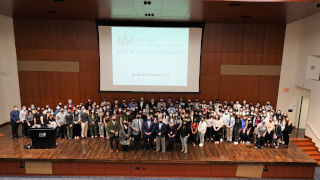Buccino Leadership Institute Namesake Offers Students Insight on the 10 Fundamental Pillars of Leadership - Seton Hall University
Wednesday, February 16, 2022

Dr. Buccino and Students from his Leadership Institute.
On Friday, February 11th, Buccino Leadership Institute students were granted the presence of Dr. Buccino himself, and his lecture on leadership characteristics, styles, and tips for success. Students of all grade levels had the opportunity to hear his insight on his fundamental pillars of leadership, while also sharing advice for the workplace and personal life.
Dr. Gerald Buccino graduated from Seton Hall University in 1963, and in 2018 the Buccino Leadership Institute, the first interdisciplinary undergraduate leadership program, expanded out of Dr. Buccino's generosity. Since its establishment, the Buccino Leadership Institute has been nationally recognized, and it has ranked number one in leadership development in the nation for five years in a row.
Dr. Buccino's background is in the Turnaround Management industry, and he is the founding member of the Turnaround Management Association, where he is often considered a pioneer of the field. Within Buccino & Associates Inc, the firm produces one of the most successful turnaround management and crisis management services.
When talking about leadership, Dr. Buccino believes that there are ten fundamental characteristics that create an effective leader. Anyone can be a leader, but in order to lead, you must be effective. As a student, being in a leadership position is a privilege since leaders have the ability to impact lives. Leadership also has a purpose, which is also shared with passion. Every leader has a reason to why they are sacrificing their time to lead, and it often is their main motivator. In dealing with other people, it is about who you are as a leader; anyone can be a leader, but it is up to you to become an effective leader.
In his lecture, Dr. Buccino described how he believes that there are ten fundamental characteristics that leaders exhibit:
- Credibility. The first characteristic that he considers the foundation of leadership. If you are not trustworthy as a leader, no one will follow you and the goals you are trying to obtain. Having an open environment of honesty and trust is crucial to establishing credibility as a leader.
- Courage defines someone who can make difficult decisions. As a leader, you must be willing to make a sacrifice.
- Temperament is also an attribute of one's leadership capability. A leader must be able to stay calm and resilient through difficult times and scenarios.
- Optimism allows for the workplace to be comfortable and boosts morale during difficult times, allowing the group to solve problems and improve. Leaders are not afraid to fail and focus on what is needed, not what is wrong.
- Passion. Along with being an optimistic leader, one must have passion to convince others to believe in your plan. Every leader should love what they do. Passionate leaders are able to maximize productivity and help achieve their desired goal or outcome.
- Vision within leadership is essential because focusing the group's attention on what is most important will allow for optimal success. A visionary works hard to ensure that the vision of the group coincides with the future. A vision can be what you as a leader are most passionate about, but also a vision of your company or yourself as a leader in the future. By having motivation and drive, goals can be met.
- Competency in leadership refers to the skills you possess which make you an effective leader. Dr. Buccino explained how leadership has not changed, and neither has effective leadership. What has changed are the people behind it, and the attributes they possess. To be an effective leader, strong communication, emotional intelligence, strategic thinking, and conflict management are often examples of leadership competency.
- Strength is needed throughout the whole leadership process and is vital when a group starts to fail or loses track of their vision. Strength allows for the group to acknowledge their weaknesses, and work to overcome them.
- Risk correlates to understanding one's own strengths and weaknesses. Leaders must have the confidence and competency to determine when to take risks, as sometimes the biggest gambles have the best outcomes.
- Action allows leaders to use their power of judgment to develop solutions to the problem at hand. Work will not get done if action is not taken. Leaders do, they do not stop.
Dr. Buccino explained how these ten characteristics of effective leadership can make or break someone in the workplace. These pillars combined with soft skills, or "the secret sauce," as he phrases it, can be characterized by someone's attitude, selflessness, approachability, body language, hygiene, and punctuality. To him, these are "intangible things that influence people, whether positive or negative…These can make you selective or non-selective." Being aware of the characteristics one must possess can allow one to continue expanding their leadership abilities, as a student or professional in the workplace.
Dr. Buccino left the undergraduate students thinking about the impression they have on the world, stating, "you have ten seconds to make the right impression, not eleven. Achieving a goal should not be optional, it should be mandatory. Every brick wall has a door, and only the most determined find it. When you think you did enough, do a little more." A special thank you to Dr. Buccino for visiting the institute and sharing insight on effective leadership. Here at the Buccino Leadership Institute, we make leaders…. better!






